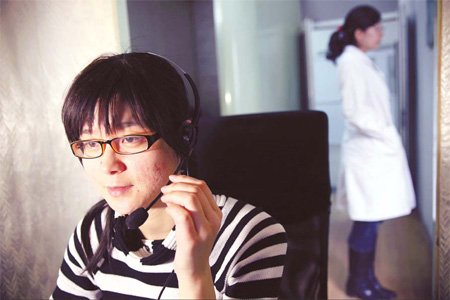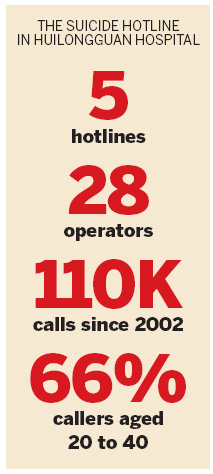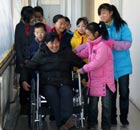Top Stories
Suicide line struggling
By Zhao Yanrong (China Daily)
Updated: 2010-03-04 09:14
 |
Large Medium Small |
|
 Wang Xiaoni from Yantai, Shandong province, answers a mental health hotline at the Huilongguan hospital.
Wang Jing / China Daily |
A suicide-prevention hotline is recruiting more trainees at a time when greater attention is being placed on mental health issues in Chinese mega-cities such as the capital.
The free hotline was set up in 2002 by Beijing Huilongguan Hospital, regarded as one of the best hospitals specializing in mental health in Beijing. Since then, it has provided more than 110,000 consultations to emotionally distraught people across China.
"More than half of the help-seekers had considered committing suicide," Wang Shaoli, deputy director of the hospital, told METRO.
"They were suffering from eating disorders and were very pessimistic."
The grassroots hotline, which is looking to recruit dozens of consultants, has been unable to keep its most experienced operators in the positions.
"There have been more than 80 people trained with our program, but only 28 people are still working with us now," Wang Cuiling, a hotline operator from the Huilongguan hospital, told METRO. Wang said many of the trainees have left for better-paying jobs.
"We used to have at least five lines during the day time and three lines at night. But for now, we don't have enough people to support them, while there is more demand our help," Wang added.

Wang said the hotline operators help calm callers and provide professional suggestions to help them overcome the negative thoughts and behavior.
"With the high speed of social transformation, the whole society is under much more pressure than ever before," Wang added. "Family and interpersonal relationship problems are two major issues for our clients."
According to consultation records, almost 70 percent of the hotline callers were 20 to 40 and holders of higher education certificates. One quarter suffered from depression.
Despite the effort to expand such hotline services, many psychologists believe that people from the groups most vulnerable to mental illness, including migrant workers, low-income families and the elderly, are not taking advantage of the opportunity.
Liu Fang, a 29-year-old resident of Chaoyang district, worries that her father, a recently retired national government official, has exhibited signs of mental troubles.
"My father did not talk much but drank a lot recently," Liu said. "He kept changing the channels when he was watching TV, and his hands could not stop shaking sometimes."
Liu suggested to her father that he see a psychological consultant because all his physical exam results were fine. That recommendation only angered him, she said.
"The most vulnerable groups are either too ashamed to talk about their problems with others and want to avoid showing weakness, or don't have the access to the consultant assistant," Shi Zhanbiao, deputy director of the mental intervention center of the institute of psychology at the Chinese Academy of Sciences, told METRO yesterday.
"The mental intervention hotline is a perfect first stop in the effort to help clients handle their psychological issues," Shi said.







